This post is also available in:
 Spanish
Spanish
Coaching can be a powerful tool to create social impact. Here are 8 ways to use coaching for social change.
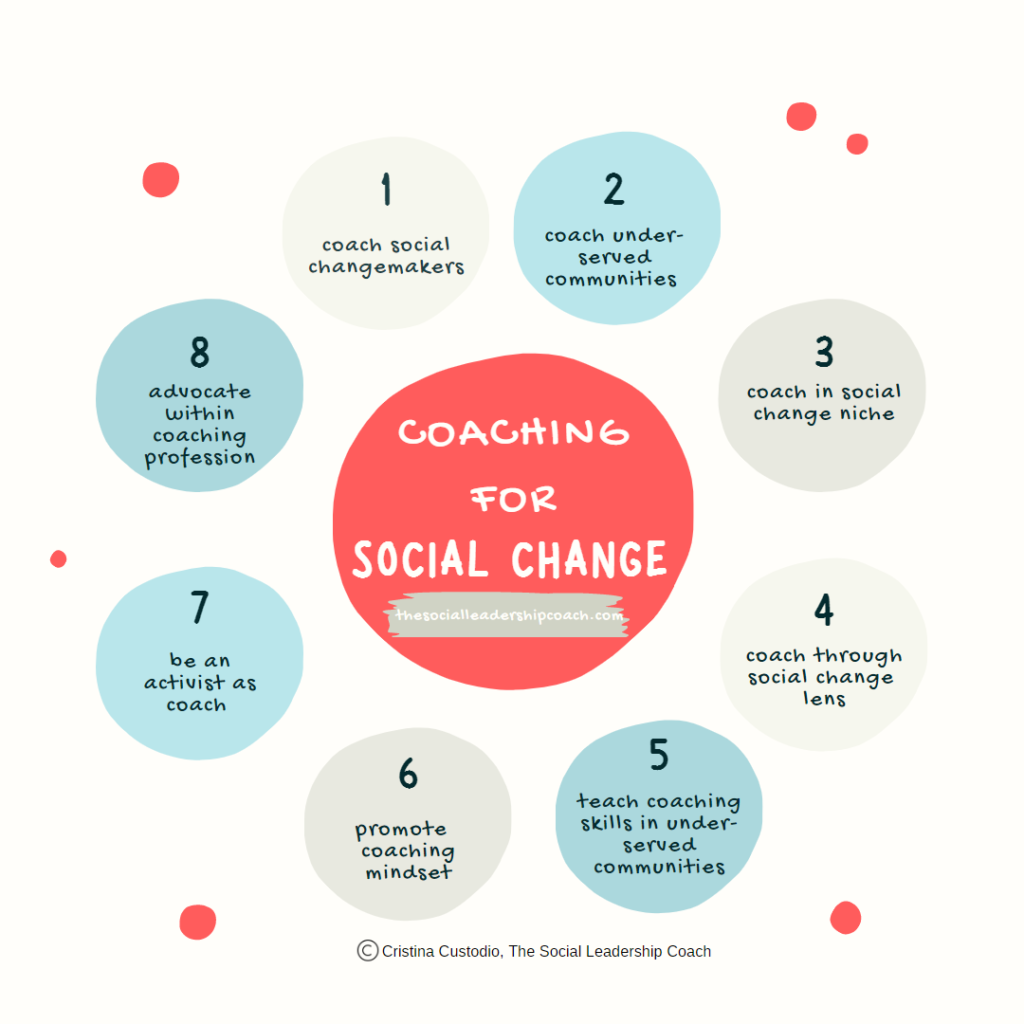
1. Coach Social Changemakers
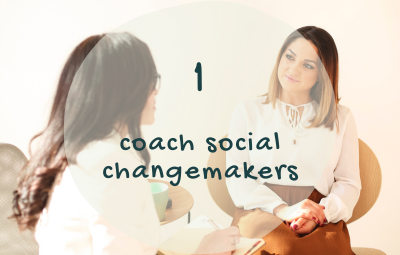
One of the most popular ways to do coaching for social change is to coach social changemakers. Social changemakers, or social leaders, are people working for a more equitable and sustainable world. They may be:
social entrepreneurs
helping professionals (teachers, health care workers, etc.)
activists
leaders in civil society
members of NGOs
workers or volunteers for non-profit organizations
Coaching social changemakers helps to amplify their work and prevent burnout. The ICF Foundation’s Ignite Program, for example, promotes coaching in organizations impacting the UN’s Sustainable Development Goals.
2. Coach Under-Served Communities
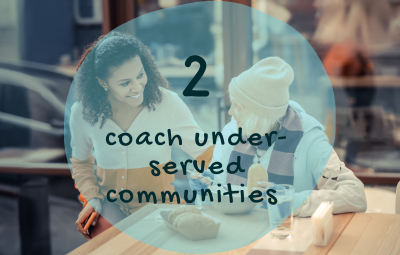
You may choose to coach people who are part of traditionally under-served communities. These communities may have less access to coaching because of:
Coach under-representation – there are not many credentialed coaches who are part of that demographic or geographic community.
Cost – they cannot pay current market coaching rates.
Lack of visibility – they are unaware or wary of coaching’s impact.
Lack of connection – they may feel disconnected from mainstream coaching methodologies.
Marginalization – these communities may be systemically excluded. Those serving prison sentences may be one example.
Crisis – cataclysmic emergencies like wars, forced migration, or natural disasters. This was the case for HR professionals in Ukraine in 2022.
3. Coach in a social change niche
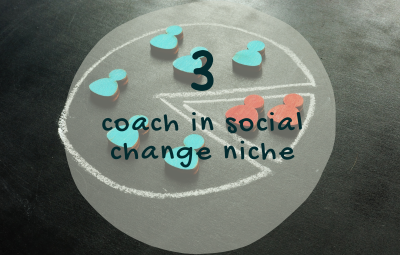
Coaches are often advised to specialize for business reasons. What if you choose a niche that aligns with your social change purpose? That’s what I did! Many coaches put coaching for social change at the center of their practice. Some, for example, may specialize in inclusion, while others may specialize in climate change.
4. Coach through a Social Change Lens
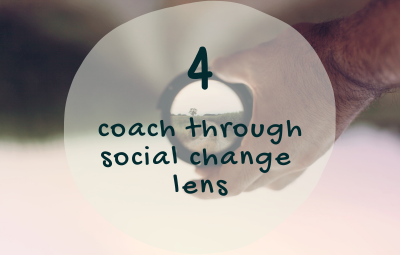
Led by scholars like Hany Shoukry and Charmaine Roche, there is a movement to challenge individualistic and “neutral” precepts in coaching. To coach through a social change lens is to acknowledge the systemic forces at play in the client’s life and in the coaching relationship. Thus, it changes both the content and approach of the session.
I encourage you to explore these thinkers’ work and reflect on how it may impact you, your clients, and your coaching.
5. Teach Coaching Skills in Under-Served Communities
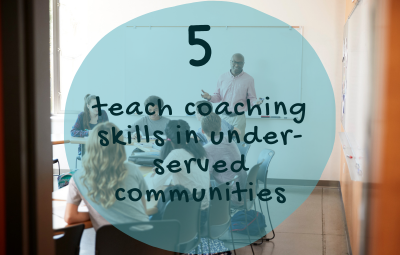
How could the world be different if everyone practiced coaching skills in their daily lives? Imagine if everyone:
Listens actively to others
Remains open to others’ ideas and ways of being
Empathizes
Builds trust with others
Maintains commitments
Cultivates learning
Coaching skills training tends to be:
Expensive
Geographically limited
Dependent on a stable internet connection
Available in only a few languages
Teaching coaching skills within under-served communities is another popular way to use coaching for social change. For example, programs like RISE 2025 and REP on the Rez offer coaching skills education to indigenous people around the globe.
6. Promote a Coaching Mindset
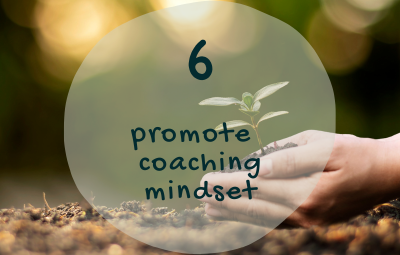
The ICF defines the coaching mindset as “open, curious, flexible, and client-centered”. Many coaches intentionally practice this mindset only while they are working. What could happen if coaches live their lives with a coaching mindset and actively promote it for others?
So, let’s swap out the word “client” for human, humanity, or the world and make some tweaks. Then, the ICF coaching mindset core competency would read something like this:
Embodies a Coaching Mindset
Definition: Develops and maintains a mindset that is open, curious, flexible, and human-centered
Acknowledges that humans are responsible for their own choices
Engages in ongoing learning and development as a person
Develops an ongoing reflective practice to enhance oneself
Remains aware of and open to the influence of context and culture on self and others
Uses awareness of self and one’s intuition to benefit the world
Develops and maintains the ability to regulate one’s emotions
Mentally and emotionally prepares for interactions
Seeks help from outside sources when necessary
7. Be an Activist as a Coach
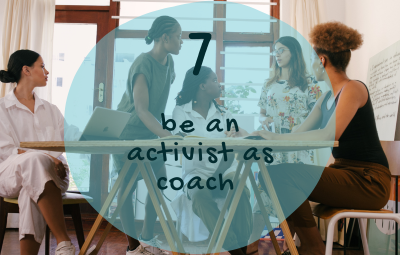
Show up for your favorite causes as a coach by putting your coaching skills and mindset to its service. Every movement needs great listeners who get people talking to build awareness and common action. A great example of this is the Climate Coaching Alliance, established in 2019.
8. Advocate within the Profession

If coaching is to serve all of humanity, then it must represent all of humanity. That means we need greater inclusion in the coaching profession for all types of diversity. Coaches may advocate for different coaching methodologies and lower barriers to entry for would-be coaches representing under-served communities. For example, Coaching for Everyone, is working to increase the number of BIPOC coaches.
Many coaches combine these 8 different practices to achieve the greatest impact. So, how are YOU using coaching for social change?
Enjoyed this Article?
Please comment and share this article with your network using the social media buttons below. You can also check out other articles in my blog. Don’t forget to subscribe to this site for exclusive offers and content. I respect my subscribers and their privacy. Thanks!
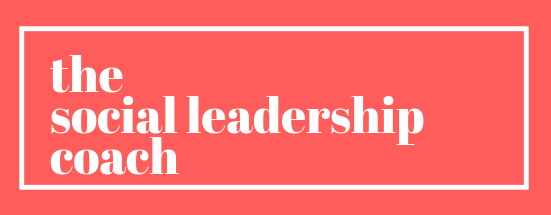
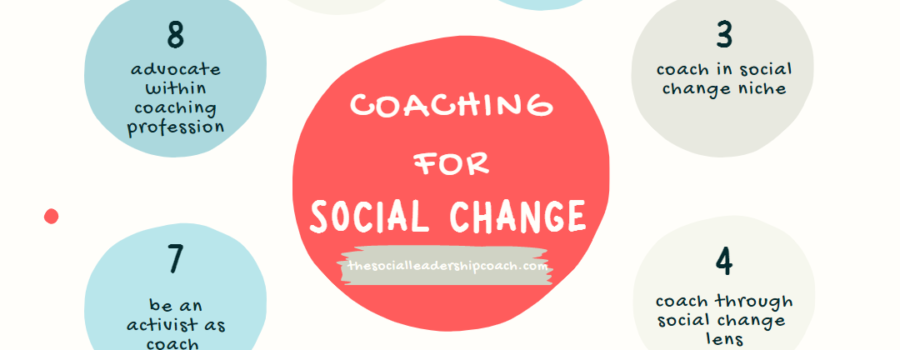
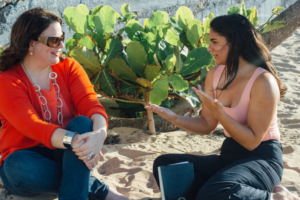




2 Comments
Leave your reply.